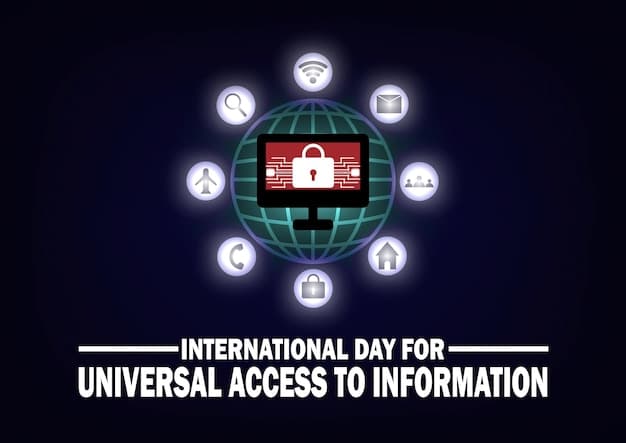Avoid Streaming Scams: Your Guide to Recognizing and Reporting Fraud

Advertisements
Avoid streaming scams by understanding the tactics fraudsters use, recognizing red flags such as unusually low prices or requests for personal information, and knowing how to report these scams to protect yourself and others.
In the digital age, streaming services have become a staple in our entertainment consumption. However, with the rise of online streaming, so has the prevalence of scams targeting unsuspecting users. It’s crucial to **avoid streaming scams** by understanding how they operate and what steps you can take to protect yourself.
Anúncios
Understanding the Landscape of Streaming Scams
Streaming scams can take many forms, from phishing emails that steal your login credentials to fraudulent services that promise access to premium content. These scams exploit the popularity of streaming platforms and the desire for affordable entertainment to prey on individuals looking for a good deal.
The methods used by scammers are constantly evolving, making it essential to stay informed and vigilant. By understanding the different types of scams and the tactics they employ, you can better protect yourself from becoming a victim.
Anúncios
Common Types of Streaming Scams
Scammers often use a variety of methods to trick users into giving up their personal information or money. Here are some of the most common types of streaming scams:
- Phishing scams: These involve emails or messages that appear to be from legitimate streaming services, asking you to update your account information or verify your payment details. These emails often contain links that lead to fake websites designed to steal your login credentials.
- Fake streaming services: These are websites or apps that claim to offer access to a wide range of content for a very low price. However, once you sign up and provide your payment information, you may find that the service doesn’t actually offer the content it promises or that your payment information is stolen.
- Account sharing scams: These scams exploit the practice of sharing streaming accounts with friends and family. Scammers may offer to sell you access to a shared account but then disappear after you pay, or they may steal your account information and sell it to others.

Staying informed about these common scams helps you recognize them more easily and avoid falling victim to their deceptive practices. Keep an eye out for suspicious emails, websites, and offers that seem too good to be true.
Recognizing the Red Flags of Fraudulent Services
Identifying fraudulent streaming services is the first step in protecting yourself. Scammers often use deceptive tactics to lure in unsuspecting users. Knowing what to look for can help you spot a scam before it’s too late.
Be wary of any streaming service that seems too good to be true, and take the time to do your research before signing up. A little bit of caution can go a long way in protecting your personal information and money.
Key Warning Signs
Several red flags can indicate that a streaming service is fraudulent. Keep an eye out for these warning signs:
- Unusually low prices: If a streaming service is offering access to a wide range of content for a price that is significantly lower than that of legitimate services, it’s likely a scam. Scammers often use low prices to entice users to sign up without doing their research.
- Requests for personal information: Be suspicious of any streaming service that asks for more personal information than is necessary for creating an account or processing payments. Scammers may try to collect your social security number, bank account details, or other sensitive information.
- Lack of customer support: Legitimate streaming services have robust customer support systems in place to help users with any issues they may encounter. If a streaming service doesn’t offer any customer support options or if its support team is unresponsive or unhelpful, it’s likely a scam.
By paying attention to these warning signs, you can avoid becoming a victim of fraudulent streaming services and enjoy your entertainment without worry.
Protecting Your Personal Information Online
In an era where digital security is paramount, safeguarding your personal information online is crucial, especially when engaging with streaming services. Your data is valuable, and scammers are constantly seeking ways to access it for malicious purposes.
Taking proactive steps to protect your personal information not only protects you from streaming scams but also enhances your overall online security. It’s an investment in your peace of mind and digital well-being.
Tips for Secure Streaming
Follow these security tips to ensure your streaming experience remains safe and secure:
Use Strong, Unique Passwords:
- Create strong, unique passwords for each of your streaming accounts. Avoid reusing passwords across multiple platforms, as this can make you vulnerable to account breaches.
- Use a combination of uppercase and lowercase letters, numbers, and symbols to make your passwords more difficult to crack.
Enable Two-Factor Authentication (2FA):
- Whenever possible, enable two-factor authentication for your streaming accounts. This adds an extra layer of security by requiring you to enter a unique code from your phone or email in addition to your password.
- Even if a scammer manages to steal your password, they won’t be able to access your account without this additional code.
Regularly Review Your Account Activity:
- Keep a close eye on your streaming account activity to detect any unauthorized access or suspicious transactions.
- If you notice anything out of the ordinary, such as unfamiliar devices logging into your account or unexpected charges, contact your streaming service’s customer support team immediately.

By implementing these security measures, you can significantly reduce your risk of falling victim to streaming scams and protect your valuable personal information.
Understanding Payment Methods and Their Risks
The way you pay for streaming services can impact your vulnerability to fraud. Different payment methods come with varied levels of security and risk. Understanding these differences can help you make informed choices.
By choosing payment methods wisely and taking necessary precautions, you can minimize your risks when paying for streaming services and protect your financial information from potential scams.
Assessing the Risks
When it comes to paying for streaming services, consider the following:
Credit Cards:
- Credit cards offer fraud protection and dispute resolution services, making them a relatively secure payment option.
- If you suspect fraudulent activity on your credit card, you can dispute the charges with your bank and potentially recover your funds.
Debit Cards:
- Debit cards are linked directly to your bank account, so fraudulent charges can result in immediate financial loss.
- While debit cards offer some fraud protection, the process of recovering funds may be more complex and time-consuming than with credit cards.
Prepaid Cards:
- Prepaid cards can be a secure option for paying for streaming services, as they limit your exposure to fraud to the amount loaded on the card.
- However, prepaid cards may not offer the same level of fraud protection as credit cards or debit cards.
Reporting Fraudulent Streaming Services in the US
If you encounter a fraudulent streaming service, reporting it is vital to protect yourself and others. There are multiple channels through which you can report such scams, helping to curb their reach and impact.
By reporting fraudulent streaming services, you contribute to a safer online environment for everyone, helping to prevent others from falling victim to these scams.
Where to Report Fraud
Here are some avenues to consider when reporting fraudulent streaming services:
Federal Trade Commission (FTC):
- The FTC is the primary federal agency responsible for protecting consumers from fraud and deceptive business practices.
- You can report fraudulent streaming services to the FTC through their website or by calling their toll-free hotline.
Internet Crime Complaint Center (IC3):
- The IC3 is a partnership between the FBI and the National White Collar Crime Center that focuses on combating internet-related crimes.
- You can file a complaint with the IC3 if you believe you have been a victim of a streaming scam.
Better Business Bureau (BBB):
- The BBB is a non-profit organization that collects and provides information about businesses, including streaming services.
- You can file a complaint with the BBB if you have had a negative experience with a streaming service and believe it is engaging in fraudulent practices.
Staying Updated on the Latest Scam Tactics
The world of streaming scams is constantly evolving, with fraudsters developing new and sophisticated tactics to deceive users. Staying informed about these emerging threats is crucial for protecting yourself and your financial information.
By investing time in staying updated on the latest scam tactics, you empower yourself to recognize and avoid these threats, contributing to a safer online environment for yourself and others.
How to Stay Informed
Here are some tips for staying updated on the latest streaming scam tactics:
Follow Reputable Cybersecurity Blogs and News Outlets:
- Subscribe to cybersecurity blogs and news outlets that provide regular updates on the latest scams and security threats. These resources often offer valuable insights into the tactics used by fraudsters and tips for protecting yourself.
Join Online Forums and Communities:
- Engage in online forums and communities that discuss cybersecurity and online safety. These platforms can provide a space for sharing information about emerging scams and exchanging advice on how to avoid them.
Be Cautious of Unsolicited Emails and Messages:
- Exercise caution when opening unsolicited emails and messages, especially those that request personal information or ask you to click on links. Scammers often use these methods to distribute phishing scams and malware.
| Key Point | Brief Description |
|---|---|
| 🚨 Recognize Red Flags | Be alert to low prices & requests for personal info. |
| 🔒 Secure Payments | Use credit cards for better fraud protection. |
| 📣 Report Scams | Report to FTC, IC3, or BBB to protect others. |
| 🛡️ Protect Info | Use strong passwords & enable 2FA. |
FAQ
▼
A streaming scam involves deceptive practices related to online video and audio content. Scammers use tactics like phishing, fake services, or fraudulent account sharing to steal personal information or money.
▼
Look for red flags such as unusually low prices, requests for excessive personal information, and a lack of customer support. Verify service legitimacy through reviews or official channels.
▼
Stop all interactions with the service immediately. Change your passwords for any accounts that might be compromised and monitor your financial accounts for unauthorized charges.
▼
Report the scam to the Federal Trade Commission (FTC), the Internet Crime Complaint Center (IC3), or the Better Business Bureau (BBB) to help protect others from similar scams.
▼
Use strong, unique passwords for each streaming account, enable two-factor authentication (2FA) whenever possible, and regularly review your account activity for any signs of unauthorized access.
Conclusion
Staying vigilant and informed is key to **avoid streaming scams** in the US. By understanding the tactics used by fraudsters, recognizing red flags, protecting your personal information, and reporting scams, you can enjoy streaming safely and securely. Make informed decisions and stay proactive in safeguarding your online experience.





